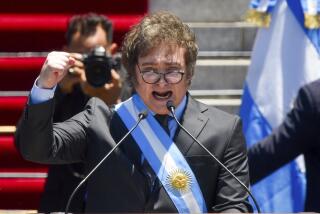IMF May Ease Its Stance on Argentine Debt
- Share via
BUENOS AIRES — No one is yet talking about headway or even momentum, but talks between Argentina and the International Monetary Fund have stirred to life, bringing cautious hope that the government may soon restructure its $150-billion debt and start to shed its deadbeat status.
Argentina’s economy has been crawling back from its December 2001 collapse, which triggered the largest sovereign debt default in history and a peso devaluation that robbed millions of Argentines of their life savings. Booming exports of meat and grains have built a modest cash surplus, the stock market is up 40% over 2002, and economic growth of 4% is expected this year.
But in a country where the gross domestic product shrank by 21% last year, analysts warn that this nation remains too fragile to sustain any further belt-tightening. Nearly 58% of Argentines now live below the poverty line, and 20% are unemployed.
The concurrence of nascent recovery and persistent pain has given rise to a debate before the tough debt-restructuring negotiations about how much is too much to expect from a damaged nation. It also has spotlighted what Argentine authorities contend is the IMF’s culpability in the country’s financial disaster -- for ignoring deep-rooted corruption for two decades and giving a green light to privatization projects that sold national assets at fire-sale prices.
“There are lessons from the past that we can learn a great deal from,” one IMF official acknowledged, although he insisted that Argentina needs to demonstrate its resolve by committing some of its surplus to debt service.
President Nestor Kirchner vowed at his May 25 inauguration that he would focus on creating jobs by spending the surplus on social programs and public works. He also endorsed a moratorium on single-family home foreclosures -- a move that defied IMF criteria for debt restructuring but bought breathing room for many of the 250,000 homeowners on the verge of default.
Like many of the positions the new president has taken in his first two months in office, the tough stand against bowing to creditors has won Kirchner popular support. It also appears to have spurred the IMF to reconsider its position.
Shortly after Kirchner came to power, IMF Managing Director Horst Koehler paid a visit during which, according to one source, he was persuaded that the agency was obliged to examine its own behavior in the debt crisis. Since then, the IMF has deployed a mission to tackle the Argentine default.
Kirchner’s sweep through Europe this week kindled support from key creditors such as Germany and Spain for a grace period before Argentina must resume paying institutional lenders. A $2.9-billion payment is due the IMF on Sept. 9.
In Washington on Thursday, IMF spokesman Thomas C. Dawson confirmed that Argentina was considered a “priority” and that the agency was working to seal a restructuring accord.
John Taylor, undersecretary for international affairs at the U.S. Treasury, said that he saw no reason why a new debt management plan couldn’t be reached in the next few weeks.
Economic analysts here suggest that Argentina has the upper hand in the talks because of the IMF’s alleged responsibility in the disaster. They also argue that creditors have better prospects of recovering their money if Argentina is given a grace period in which to prosper and build on its cash reserves, which amount to only $13 billion.
“Argentina was raped. It was sacked with the complicity of the majority of politicians and businessmen in Argentina and with the IMF that closed its eyes when this happened,” insisted Daniel Muchnik, an economist who writes for the Clarin daily.
He warned that the “social time bomb” ticking within Argentina’s hordes of hungry and unemployed would explode if the government was perceived as caving in.
Kirchner has changed the dynamics of the IMF dialogue, a move that has the full support of the Argentine population, said Claudio Lozano, an economist. With Argentines only recently recovering some trust in their government and institutions, the IMF has to concede some ground to Kirchner to strengthen his legitimacy, Lozano said.
“The IMF recipe will not resolve the problem,” the economist said, adding that the agency’s demands to reform the banking, tax and budgeting systems will take years, if not decades. “Argentina needs a grace period. It cannot transfer its whole growth as payment of debt. It needs to reinvest in itself to keep the growth going.”
More to Read
Sign up for Essential California
The most important California stories and recommendations in your inbox every morning.
You may occasionally receive promotional content from the Los Angeles Times.














